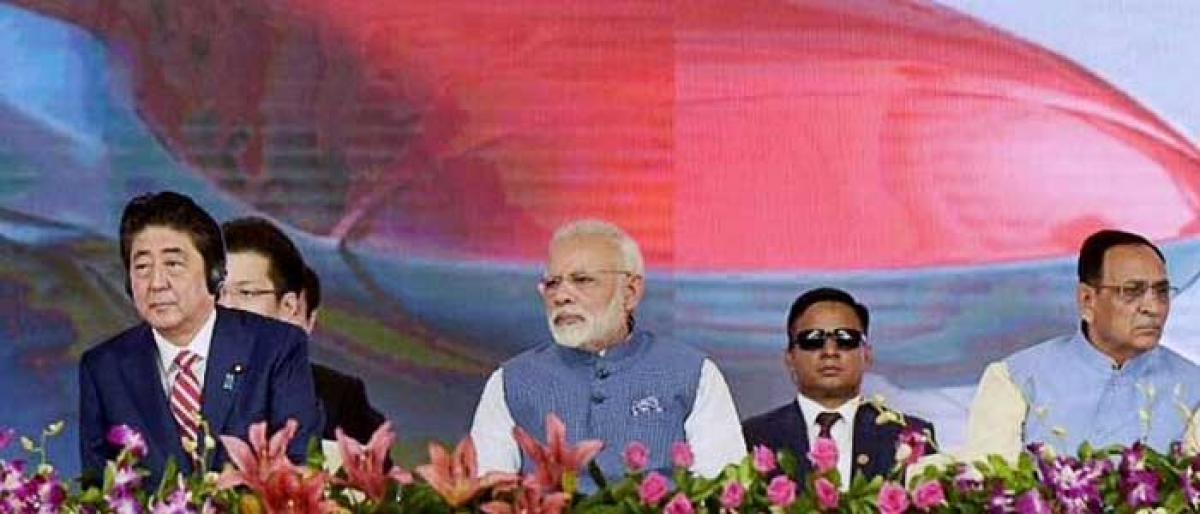Live
- GMR Airports Unveils AI-Powered Digital Twin Platform to Transform Airport Operations
- India poised to become leading maritime player: PM Modi
- Top Causes of Kidney Stones and How to Recognize Silent Symptoms
- India’s renewable energy capacity logs 14.2 pc growth at 213.7 GW
- Winter Session of Odisha Assembly adjourned sine die
- Biden calls Trump's tariff approach 'major mistake'
- After Drama Over Eknath Shinde’s Chief Minister Race, Maharashtra Cabinet Formation Faces New Tensions
- Egyptian FM, Blinken discuss recent developments in Syria
- Iran's supreme leader says Syria's developments result of US-Israeli 'plot'
- Elon Musk to Purchase $100 Million Luxury Mansion Next to Donald Trump's Mar-a-Lago, Report Reveals
Just In

Breaking the ground for the ambitious Rs 1 lakh crore Bullet Train with major Japanese aid, India and Japan on Thursday elevated their bilateral ties to new levels and called for a free and open Indo-Pacific region where sovereignty and international laws are respected, in an apparent message to China which has disputes with most neighbours in the South China region.
Gandhinagar: Breaking the ground for the ambitious Rs 1 lakh crore Bullet Train with major Japanese aid, India and Japan on Thursday elevated their bilateral ties to new levels and called for a free and open Indo-Pacific region where sovereignty and international laws are respected, in an apparent message to China which has disputes with most neighbours in the South China region.
A day after staging an unusual road show in Ahmedabad, which critics said was done with an eye on upcoming Gujarat polls, Prime Minister Narendra Modi held his annual bilateral summit with Japanese Prime Minister Shinzo Abe and came out with a 13-page joint statement titled "Toward a Free, Open and Prosperous Indo-Pacific" laying out the new contours of the relationship.
In a snub to Pakistan, the two countries urged it to bring to justice the masterminds behind the Mumbai and Pathankot terror attacks. They pressed all countries to work towards rooting out terrorist safe havens and infrastructure, disrupting terror networks and financing and halting cross-border movement of terrorists.
The highlight of the day was the commencement of the work on the Ahmedabad-Mumbai High Speed Rail Project, modelled on the lines of the famous Shinkansen (Bullet Train) technology by symbolic digging of the earth at the Sabarmati railway station. Modi hailed the project that will help passengers cover 500 km in three hours at a speed of over 300 km per hour as a "new pace" in India's progress to achieve a "new India" by 2022.
Addressing the media, Modi said this was not just the start of a high-speed rail. "Keeping in mind our needs in the future, I believe this new railway philosophy will be the lifeline to a new India," he said. "India's continuing development has now been linked to high speed."
In his remarks at the ground-breaking ceremony of the rail project, Abe said "a strong India is in Japan's interest, and a strong Japan is in India's interest. Today, on this day, that part of the bright future is seen in solid form".
Modi thanked the people and Parliament of Japan for ratifying the civil nuclear agreement signed during his visit to that country. "This will open a new chapter in our cooperation on clean energy and climate change."
The project adds to the growing list of major India-Japan infrastructure cooperation projects. The discussions between the two leaders covered the entire gamut of special, strategic and global partnership and dealt with various issues, including the recent Doklam military standoff between India and China that ended ahead of Modi's visit to China for the BRICS Summit.
Briefing the media after the summit, Foreign Secretary S. Jaishankar said both sides agreed to root out safe havens for terrorists and cooperate against terrorist threats from groups like Al Qaeda, Islamic State, Jaish-e-Mohammad and Lashkar-e-Taiba.

© 2024 Hyderabad Media House Limited/The Hans India. All rights reserved. Powered by hocalwire.com







